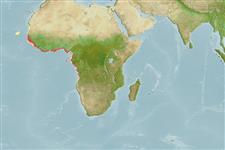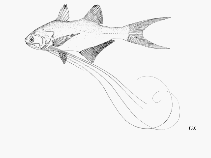Pentanemus quinquarius (Linnaeus, 1758)
Royal threadfin
Add your observation in Fish Watcher
| Native range | All suitable habitat | Point map | Year 2050 |

|
| This map was computer-generated and has not yet been reviewed. |
| Pentanemus quinquarius AquaMaps Data sources: GBIF OBIS |
Upload your photos and videos
Pictures | Google imagePentanemus quinquarius
Picture by FAO
Pictures | Google imagePentanemus quinquarius
Picture by FAO
Guinea country information
Common names:
Gbalakassa
Occurrence: native
Salinity: brackish
Abundance: | Ref:
Importance: minor commercial | Ref: FAO, 1994
Aquaculture: | Ref:
Regulations: | Ref:
Uses: no uses
Comments: Occurs in Fatala River (Ref. 28587). Reported from the Guinea shelf (Ref. 47102).
National Checklist:
Country Information: https://www.cia.gov/library/publications/resources/the-world-factbook/geos/gv.html
National Fisheries Authority: http://www.fis-net.com/guinea
Occurrences: Occurrences Point map
Main Ref: Daget, J. and J.C. Njock, 1986
National Database:
Occurrence: native
Salinity: brackish
Abundance: | Ref:
Importance: minor commercial | Ref: FAO, 1994
Aquaculture: | Ref:
Regulations: | Ref:
Uses: no uses
Comments: Occurs in Fatala River (Ref. 28587). Reported from the Guinea shelf (Ref. 47102).
National Checklist:
Country Information: https://www.cia.gov/library/publications/resources/the-world-factbook/geos/gv.html
National Fisheries Authority: http://www.fis-net.com/guinea
Occurrences: Occurrences Point map
Main Ref: Daget, J. and J.C. Njock, 1986
National Database:
Common names from other countries
Classification / Names Κοινά ονόματα | Συνώνυμα | Catalog of Fishes(Γένος, Είδη) | ITIS | CoL | WoRMS | Cloffa
> Carangaria/misc (Various families in series Carangaria) > Polynemidae (Threadfins)
Etymology: Pentanemus: Greek, pente = five + Greek, nema = filament (Ref. 45335).
More on author: Linnaeus.
Etymology: Pentanemus: Greek, pente = five + Greek, nema = filament (Ref. 45335).
More on author: Linnaeus.
Environment: milieu / climate zone / depth range / distribution range Οικολογία
Θαλασσινό(ά); Υφάλμυρο βενθικό(ς); εύρος βάθους 10 - 70 m (Ref. 10799). Tropical; 21°N - 18°S, 27°W - 14°E (Ref. 57343)
Κατανομή Χώρες | Περιοχές FAO | Οικοσυστήματα | Παρουσίες | Point map | Εισαγωγές | Faunafri
Eastern Atlantic: Senegal to Angola (Ref. 57402). Also reported from Mauritania (Ref. 10799) and Cape Verde (Ref. 27000). Reported from Cuba based on a single specimen; no other specimens taken from the western Atlantic (Ref. 57343).
Length at first maturity / Μέγεθος / Βάρος / Age
Maturity: Lm 15.0 range ? - 17 cm
Max length : 35.0 cm TL αρσενικό/απροσδιόριστο; (Ref. 57402); common length : 25.0 cm TL αρσενικό/απροσδιόριστο; (Ref. 3659)
Max length : 35.0 cm TL αρσενικό/απροσδιόριστο; (Ref. 57402); common length : 25.0 cm TL αρσενικό/απροσδιόριστο; (Ref. 3659)
Short description Κλείδες προσδιορισμού | Μορφολογία | Μορφομετρία
Ραχιαίες άκανθες (συνολικά) : 9; Μαλακές ραχιαίες ακτίνες (συνολικά) : 14 - 18; Εδρικές άκανθες: 3; Μαλακές εδρικές ακτίνες: 28 - 30. Diagnosis: detached pectoral filaments very long, exceeding body length; base of anal fin much longer than base of 2nd dorsal fin; body moderately elongate and compressed, its height comprised 3.0-3.4 in standard length; snout very short, blunt and prominent; mouth inferior; maxillary bone strongly widened at its end, reaching largely past eye; 2 widely separated dorsal fins, 1st with 8 flexible spines, 2nd with 1 spine and 14-18 soft rays; anal fin base much longer than 2nd dorsal fin base; pectoral fin inserted very low on body; threadlike filaments, 5 in number, 4 of them longer than total length of fish; scales ctenoid; head scaly (Ref. 57402).
Coloration: body uniformly silvery, greyish on back, shading to whitish ventrally; fins tinged with yellow (Ref. 57402).
Occurs over sandy (Ref. 2683) and muddy bottoms in shallow waters (Ref. 57343), frequently in brackish waters (Ref. 57343, 57402) and estuaries (Ref. 57402). Carnivorous (Ref. 57402), feeds on fish and shrimps (Ref. 28587).
Life cycle and mating behavior Γεννητική Ωρίμανση | Αναπαραγωγή | Γεννοβολία | Αβγά | Γονιμότητα | Προνύμφες
Main reference
Upload your references | Αναφορές | Συντονιστής | Συνεργάτες
Motomura, H., 2004. Threadfins of the world (Family Polynemidae). An annotated and illustrated catalogue of polynemid species known to date. FAO Spec. Cat. Fish. Purp. Rome: FAO. 3:117 p. (Ref. 57343)
IUCN Red List Status (Ref. 130435: Version 2024-2)
Ευάλωτο, βλέπε Κόκκινη Λίστα (VU) (A2bd); Date assessed: 15 July 2014
Threat to humans
Harmless
Human uses
αλιεία: πολύ εμπορικό
FAO(αλιεία: Παραγωγή; publication : search) | FishSource | Η θάλασσα γύρω μας
Περισσότερες πληροφορίες
Population dynamics
Παράμετροι Αύξησης
Max. ages / sizes
Length-weight rel.
Length-length rel.
Length-frequencies
Mass conversion
Στρατολόγηση
Αφθονία
Παράμετροι Αύξησης
Max. ages / sizes
Length-weight rel.
Length-length rel.
Length-frequencies
Mass conversion
Στρατολόγηση
Αφθονία
Life cycle
Αναπαραγωγή
Γεννητική Ωρίμανση
Γονιμότητα
Γεννοβολία
Spawning aggregations
Αβγά
Egg development
Προνύμφες
Δυναμική προνυμφών
Αναπαραγωγή
Γεννητική Ωρίμανση
Γονιμότητα
Γεννοβολία
Spawning aggregations
Αβγά
Egg development
Προνύμφες
Δυναμική προνυμφών
Anatomy
Επιφάνεια βραγχίων
Brain
Otolith
Επιφάνεια βραγχίων
Brain
Otolith
Physiology
Body composition
Nutrients
Κατανάλωση οξυγόνου
Κολυμβητικός τύπος
Ταχύτητα κολύμβησης
Visual pigments
Fish sound
Diseases & Parasites
Toxicity (LC50s)
Body composition
Nutrients
Κατανάλωση οξυγόνου
Κολυμβητικός τύπος
Ταχύτητα κολύμβησης
Visual pigments
Fish sound
Diseases & Parasites
Toxicity (LC50s)
Genetics
Γενετική
Heterozygosity
Κληρονομικότητα
Γενετική
Heterozygosity
Κληρονομικότητα
Human related
Aquaculture systems
Προφίλ υδατοκαλλιεργειών
Στελέχοι
Ciguatera cases
Stamps, coins, misc.
Aquaculture systems
Προφίλ υδατοκαλλιεργειών
Στελέχοι
Ciguatera cases
Stamps, coins, misc.
Εργαλεία
E-book | Οδηγός πεδίου | Κλείδες προσδιορισμού | Ανάλυση κατά μήκος συνθέσεων | Εργαλείο ιστορίας ζωής | Σημειακός χάρτης | Classification Tree
| Catch-MSY |
Special reports
Download XML
Διαδικτυακές πηγές
Aquatic Commons | BHL | Cloffa | Websites from users | Check FishWatcher | CISTI | Catalog of Fishes(Γένος, Είδη) | DiscoverLife | ECOTOX | Faunafri | Fishtrace | GenBank(genome, nucleotide) | GloBI | GOBASE | | Google Books | Google Scholar | Google | IGFA World Record | MitoFish | Otolith Atlas of Taiwan Fishes | PubMed | Reef Life Survey | Scirus | SeaLifeBase | Δέντρο Ζωής | Wikipedia(Go, αναζήτηση) | World Records Freshwater Fishing | Zoological Record
Estimates based on models
Preferred temperature (Ref. 115969): 20.2 - 27.9, mean 25.8 (based on 70 cells).
Phylogenetic diversity index (Ref. 82804): PD50 = 1.0000 [Uniqueness, from 0.5 = low to 2.0 = high].
Bayesian length-weight: a=0.00398 (0.00236 - 0.00672), b=3.13 (2.99 - 3.27), in cm Total Length, based on LWR estimates for this species & (Sub)family-body (Ref. 93245).
Τροφικό Επίπεδο (Ref. 69278): 3.6 ±0.57 se; based on food items.
Ελαστικότητα (Ref. 120179): Υψηλό, ελάχιστος χρόνος για διπλασιασμό πληθυσμού < 15 μήνες (K=0.72).
Fishing Vulnerability (Ref. 59153): Low to moderate vulnerability (31 of 100).
Climate Vulnerability (Ref. 125649): High to very high vulnerability (75 of 100).




